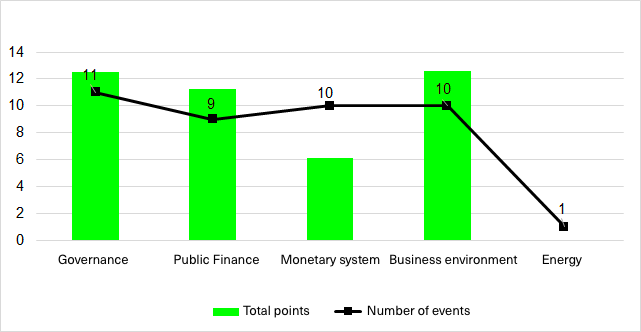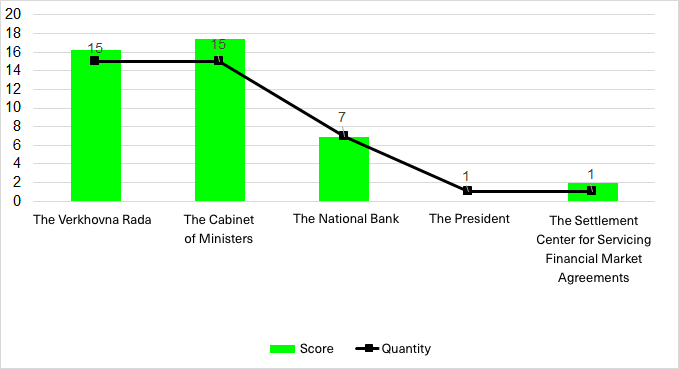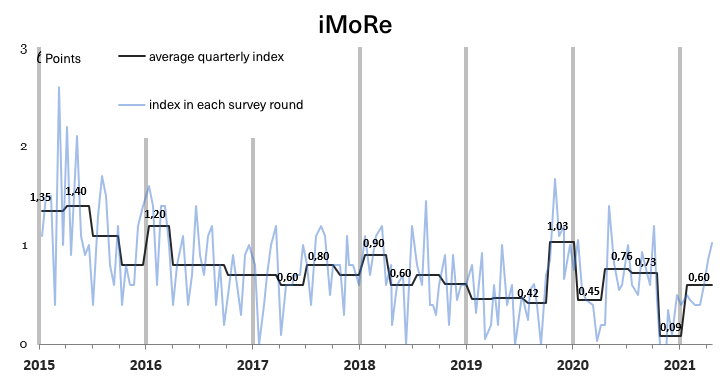After a total failure to do reform at the end of the previous year and the Constitutional Court’s scandalous decision that challenged the country’s anti-corruption system, the government authorities decided to buckle down in early 2021. The pace of reform has accelerated significantly.
At the beginning of 2021, they managed to get things moving by passing the law on inland water transport, electronic communications, financial leasing and the establishment of the Bureau of Economic Security. Such a wide range of areas can be considered both a positive development and a disadvantage, as it may be indicative of the government’s dispersed efforts and a certain lack of focus. But what was really negative in the first quarter of 2021 is a reduction in the VAT rate for some types of agricultural products. The new regulation blurs the “rules of the game” for business and may reduce tax revenues to the state budget.
Another change being discussed is the law on “investment nannies”. In the Reform Index, it fell within two categories at once: public finance and business environment. However, receiving both positive and negative expert feedback in both, it obtained a final score of 0,0 points.
More details on reforms below.
The main events of the first quarter of 2021:
Among all the regulations issued by government agencies, the Index’s experts selected 39 that could affect the rules of the game in the country (in the fourth quarter we had counted only 16 important changes against a whopping 50 in the preceding quarter). Among these are 34 reforms, 3 zero-point events and 2 anti-reforms. The average event score in the round was +1.1 points (ranging from +5 to -5). It is a third more than in the previous quarter with its average points score of +0.7 due to the Constitutional Court’s decision on the unconstitutionality of the provisions of the law on preventing corruption and the small number of reforms.
The Powerful Three
This time, the three reforms exceeded +2.0 points, which, in our opinion, separates significant reforms from less important ones.
Among the top reforms in the first quarter of 2021 are:
✓ Law on electronic communications (Reform Index 152, +3.0 points) significantly simplified licensing procedures for communications providers. Previously, companies could obtain a license for a specific frequency only (2G, 4G, etc.). The new law introduced a single license regardless of the technology used.
The law also strengthens the capacity of the regulator – the National Commission for the State Regulation of Communications and Informatization (NCCIR). The Commission will now do geographical monitoring of the operators to see the level of network coverage of different regions of Ukraine. Besides, the law provides additional protections for consumers. The Commission is to develop a procedure for out-of-court settlements of subscribers’ complaints, in particular in the event when an operator does not provide the speed specified in the agreement.
✓ Decree on determining the organizations that will deliver pensions on a competitive basis (Reform Index 157, +2.9 points) should change the situation when Ukrposhta is the only company delivering pensions and social benefits to people’s doors. The Pension Fund’s board now must decide on the service provider on a competitive basis. It can be a postal services company operating for at least five years and providing services within the territorial units where pensions are to be paid. There are currently about 100 companies in the Register of Postal Operators and about half of them meet the criteria set. There will be competition!
✓ Law on the Bureau of Economic Security (Reform Index 157, +2.5 points) introduces a single agency responsible for investigating economic crimes. The main function of the BES will be analytical work, not law-enforcement powers. The Bureau will analyze the beneficiaries of financial transactions and see whether or not movements of funds by business enterprises and government agencies contain a violation of the law. When the Bureau is fully operational, the task of investigating economic crimes will be transferred to it from the SBU and the National Police, and the tax police will be eliminated.
Three zeros
Zero points were given to the controversial reforms on which the experts’ views differed, as well as to the minor changes, which, according to Reform Index experts, cannot significantly affect the rules of the game in the country. In this round, we counted three such regulations.
✓ Investment nanny law (Reform Index 154, 0.0 points) provides financial support in the form of tax benefits, access to infrastructure and advisory support for investments exceeding EUR 20 million for a period of up to five years. It also defines the key principles of operation of UkraineInvest, set to provide support to big investors. Considering its impact potential, the law fell within two categories (public finance and business environment). Yet, its score is 0.0 points. “While certain elements of instnyanya are good, the general spirit of the program is to have special access to government services, which is contrary to the spirit of creating a level field”, explains Yuriy Gorodnichenko, professor at the University of California, Berkeley, and VoxUkraine co-founder.
0.0 points also went to:
✓ raising the minimum retail price for sparkling wines (Reform Index 152, 0.0 points), i.e. introducing additional regulation in a competitive market. The idea of this change is to protect Ukrainian wines from dumping on the part of foreign wine beverages. The Ministry of Economy believes that equalizing the prices will enable Ukrainian producers to regain lost market share.
✓ setting a single, fixed price for electricity for domestic consumers (Reform Index 151, 0.0 points). It was done to curb a sharp rise in tariffs for consumers, as the previous regulations introduced market prices, which would lead to a sharp (more than 2.5-fold) increase in tariffs.
The two anti-reforms:
✓ Law reducing the VAT rate from 20% to 14% for certain types of agricultural raw materials (Reform Index 155, -1.0 point), such as livestock products, grain crops, and seeds not used by end consumers. The law is supposed to combat the “twists” that companies use to avoid paying VAT. “This has got to do with the fact that the harvest doesn’t directly depend on the quantities of fertilizers or fuel used. Hence there exist schemes like when the filling stations unofficially sell diesel for cash, while on paper it is sold to agricultural producers”, explains the bill’s co-author, MP Maryan Zablotskyi. The law was supported by plant growers exporting their products because for them, the cash gap will be reduced when waiting for VAT rebates from the state. However, stock farmers stood against the law as it means higher prices for feeding stuffs. The law also makes it not advantageous for the processers selling in the domestic market. Experts also gave a negative assessment of the law because firstly, it creates distortions in the agricultural market and secondly, it can reduce tax revenues to the state budget. It is not certain, however, that it can help do away with the “twists”.
✓ Parliament ”exempted” gas from the law on public procurement (Reform Index 152, -0.25 points). This law transfers gas purchases from the ProZorro system to specialized commodity exchanges that meet the requirements of the Gas Transmission System Code. “This should have a positive impact on liquidity and business activity in the gas market, which will help integration (market coupling) with European markets and have a positive impact on competition”, says Roman Nitsovych of Dixie Group. At the same time, the law contains risks: “Considering that the list of exceptions to the Law on Procurement, which is conceptually consistent with EU Directives, is expanding, this may negatively affect Ukraine’s relations with the EU. Besides, it is not clear whether purchasing natural gas on commodity exchanges will be more efficient than through ProZorro”, explains Nataliia Shymko, Deputy Director of SOE ProZorro. The law may also lead to an increase in the purchase price of gas for budget institutions (schools, hospitals, etc.) and state-owned enterprises. With such purchases, there is a risk that prices will be inflated.
What has changed in key areas?
In the first quarter, we saw progress in only four of the five observation areas: governance, monetary policy, business environment, and public finance. Despite the fact that we highlighted one notable event in the energy sector, it received 0.0 points because it could not get this area to move forward.
Chart 1. Total points by area, 1 quarter of 2021

Source: Reform Index 151-157 . Two events fell within two categories at once (public finance and business environment), hence they are counted in both. We are talking about the law on “investment nannies” and selecting an operator to deliver and pay pensions on a competitive basis. Therefore, even though the number of events in the quarter is 39, one can count 41 events on the chart.
Governance
We spotted 11 important changes in this area. 7 of them were initiated by Parliament, with the other 4 initiated by the Cabinet of Ministers. Among the important reforms not mentioned above are:
✓ amendments to the Budget Code on distribution of revenues and expenditures between local budgets (Reform Index 151, +1.75 points), in particular mandating the transfer of powers and funds from the district councils that are in the process of liquidation to the communities (hromadas), as well as the composition of revenues and expenditures made from hromada budgets. Other changes include the introduction of portfolio guarantees, i.e. the Cabinet of Ministers is authorized to provide state guarantees to banks on a portfolio of loans to small and medium-sized businesses, and the introduction of medium-term health commitments. That is, with regard to healthcare projects, the funds not used during the year will be carried over to the next year.
✓ changes in the rules for participating in meetings of local council deputies having a conflict of interest (Reform Index 156, +1.0 points). Previous regulation allowed for the participation of local council deputies in decision-making even in the event of a conflict of interest (subject to public disclosure). Now, such participation is possible only if the collegial body loses authority, if such a person would not participate in decision-making (e.g. in the absence of a quorum).
And also the laws and resolutions on the rights of persons with or without Ukrainian citizenship:
- on access to justice for citizens of Ukraine living in the temporarily occupied territory of Crimea (Reform Index 157, +0.75 points),
- on issuing biometric Ukrainian visas to foreigners and stateless persons (Reform Index 157, +1.0 points),
- on the registration as a stateless person (Reform Index 157, +1.0 points).
Read about the registration of stateless people in Ukraine and their problems in this article.
Monetary system
In the first three months of 2021, the Government approved 9 monetary policy reforms. Five of them were initiated by the National Bank, two by the Cabinet of Ministers, one by the Verkhovna Rada and one by the Settlement Center for Servicing Financial Market Agreements (where 84% of the shares belong to the NBU).
The key changes are:
✓ law on financial leasing (Reform Index 156, +2.0 points) updated the laws in this area and strengthened the protection of rights of both lessors and lessees. It provides for regulation of the transfer of ownership of the leased property at the end of its term on the basis of a financial leasing agreement without the need to enter into a separate purchase agreement. It also establishes liability for the lessees who do not return the property after termination of the agreement.
✓ the Settlement Center’s new “repo with risk control” service (Reform Index 152, +2.0 points). The stock market participants will now be able to conclude repurchase agreements for government securities using the services of a central counterparty to reduce risks. The Settlement Center will control the collateral of the participants in the clearing operations (i.e. mutual settlement transactions) in the form of monetary funds and/or securities.
Business environment
At the beginning of 2021, we spotted 10 important changes in business regulation. The Cabinet of Ministers was responsible for three of them, one was an order from the Ministry of Economy, three important reforms were initiated by the Verkhovna Rada deputies, two came from the National Bank and one from the President.
Besides the above-referenced laws on electronic communications and the decree on pension delivery on a competitive basis, it is also worth mentioning the laws on:
✓ veterinary medicine (Reform Index 156, +2.0 points) that harmonizes national legislation with the EU law and introduces a risk-oriented approach to veterinary checks. These changes should make life easier for entrepreneurs and facilitate access to the European market.
✓ inland water transport (Reform Index 151, +2.0 points) that regulates virtually all spheres of water transport, from river infrastructure to carrying goods and passengers, and boat traffic. “The development of this bill and attempts to pass it spanned the last 12 years”, notes Oleksiy Dorohan, executive director at BRDO.
Who is the greater reformer?
During the quarter, the Verkhovna Rada and the Cabinet of Ministers passed the same number of reforms – namely, 15 each. However, as for the total points score for approved regulatory changes, the Cabinet took the lead with its regulations earning a little over +17.4 points against the total reform score of the Verkhovna Rada of +16.3 points. The National Bank of Ukraine rounds out the top three reformers.
Chart 2. Reforms’ initiators in the first quarter of 2021

Source: Reform Index 151-157. Besides government regulations, the “Cabinet of Ministers” contains a decree from the Ministry for Development of Economy, Trade and Agriculture of Ukraine on introducing international approaches to implementing phytosanitary procedures.
Compared to the previous quarter, the government authorities managed to accelerate reforms. However, it was not difficult, because as it turns out, the 4th quarter of 2020 was the worst in terms of the number and progress of reforms in the history of the Index.
Compared to the previous quarter, in the 1st quarter of 2021:
- the number of important regulations doubled (from 16 to 39),
- the average score of the round increased from +0.1 to +0.6 points,
- the average score of the event increased from +0.7 to +1.1 points.
However, the most important issues, such as getting anti-corruption infrastructure to work properly, judicial reform, or the laws required to get the land market going remain unresolved. We hope that the Government and MPs will have political will to adopt the necessary changes in the 2nd quarter of 2021.
Chart 3. Quarterly average value of the Index.




